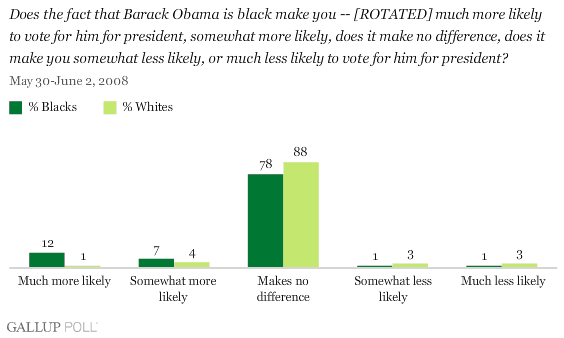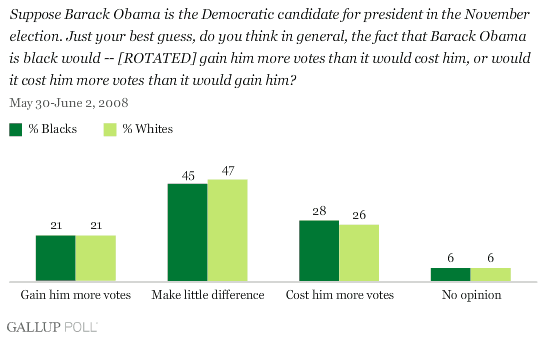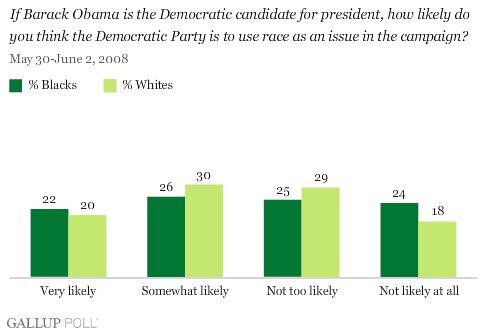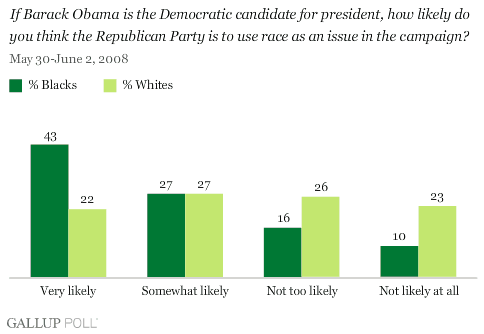PRINCETON, NJ -- A large majority of blacks, 78%, and an even larger majority of whites, 88%, say the fact that Barack Obama is black makes no difference in terms of their likelihood of voting for him for president.

This may appear to be an unusually high percentage of blacks saying Obama's race makes no difference, given that his nomination will mark a historic moment in American political history -- the first black candidate to capture a major party's nomination.
Without question, blacks are going to vote for Obama in overwhelming numbers; the latest ║┌┴¤═° tracking shows that Obama gets 93% of the black vote when pitted against Republican John McCain in a hypothetical trial heat.
So on the one hand, black voters say Obama's race makes no difference to them, and on the other hand, about 9 out of 10 blacks say they will vote for Obama. But the high percentage of the black vote going to Obama is not unusual. ║┌┴¤═° polling estimated that John Kerry received 93% of the black vote in 2004, and Al Gore received 95% in 2000. So it may be that black voters are making the (correct) self-observation that they would be voting for the Democratic candidate regardless of his or her race, meaning that Obama's particular race is not a deciding factor for them.
Whites are even less likely than blacks to say Obama's race would be a factor in their vote. Eighty-eight percent of non-Hispanic whites say his race makes no difference. Six percent of whites say they are less likely to vote for Obama because of his race; 5% say they are more likely to vote for him. There has been discussion this year of a "hidden" race factor in which certain groups of white voters will end up not voting for Obama because he is a black candidate. What these data show is that more than 9 in 10 whites, when asked about Obama's race directly, deny that it will be a negative factor in their vote.
A separate poll question measured the perceived impact of Obama's race by asking respondents to speculate about the impact of race on the election more generally.

In this case, there is more variation in opinions, among both blacks and whites.
Blacks are quite divided in their responses to this question. A little more than a quarter, 28%, say Obama's race will cost him more than it will gain him in the election. But 21% of blacks give the opposite response and say Obama's race will be a net plus for his candidacy. The rest, 45%, say it will make little difference.
The responses among whites to this question are remarkably similar to the responses among blacks, differing by just a few percentage points.
A third set of questions asked about the potential use of race (the "race card" one hears so much about in campaign coverage) by the two political parties.


Blacks appear to believe race will be a factor in the way the election campaign is run by both Republicans and Democrats, but more so for the former than the latter.
Forty-eight percent of blacks say the Democrats' campaign will make race a factor this year, while 70% say Republicans will use race as an issue. Whites are much more uniform in their responses to this question: About half say each party will use race as an issue in the campaign.
The question did not ask respondents specific follow-up questions about how race would be used in the campaign, so it is unclear whether respondents who believe race will be made an issue think this is good or bad. Most blacks identify themselves as Democrats, making the precise meaning of the fact that half of blacks interviewed think the Democratic Party will use race as a factor in the campaign even less clear. It can be hypothesized that the strong majority of blacks who say Republicans will use race as an issue view that possibility in a more negative light.
Implications
Blacks overwhelmingly have favored the Democratic candidate in past elections, while the Republican candidate has typically won the majority of the white vote. General-election voting data so far in this campaign show that this pattern is continuing this year. Race is a strong factor in projected voting for Obama against McCain (as it was in Obama's Democratic primary race against Hillary Clinton). Blacks are overwhelmingly likely to vote for Obama, while the majority of non-Hispanic whites indicate that they will vote for McCain.
The analytic question becomes one of ascertaining whether the historic nature of Obama's nomination as a major-party black candidate will have an impact above and beyond the usual patterns of racial differences in voting.
The data reviewed here suggest that while most voters deny that Obama's race affects them personally, many do think it will have an effect on the race overall -- either helping Obama or hurting him. Still, there is no consensus on the part of the average voter on whether Obama's race will be a net plus or a net minus.
Thus, there is little guidance from the voters themselves in the attempt to answer the question about the ultimate impact of Obama's race on the campaign this year.
Survey Methods
Results are based on telephone interviews with 1,012 national adults, aged 18 and older, conducted May 30-June 1, 2008. For results based on the total sample of national adults, one can say with 95% confidence that the maximum margin of sampling error is ┬▒3 percentage points.
Results for the sample of 780 non-Hispanic whites, aged 18 and older, are based on telephone interviews drawn from the national sample poll. For results based on the total sample, one can say with 95% confidence that the maximum margin of sampling error is ┬▒4 percentage points.
Results for blacks are based on telephone interviews with 250 blacks, aged 18 and older, conducted May 30-June 2, 2008, some of which were drawn from ║┌┴¤═°'s May 30-June 1 national sample and some of which were drawn from a special black oversample conducted May 30-June 2. The combined sample of blacks is weighted to be representative of U.S. blacks. For results based on the total sample, one can say with 95% confidence that the maximum margin of sampling error is ┬▒7 percentage points.
Interviews are conducted with respondents on land-line telephones (for respondents with a land-line telephone) and cellular phones (for respondents who are cell-phone only).
In addition to sampling error, question wording and practical difficulties in conducting surveys can introduce error or bias into the findings of public opinion polls.
To provide feedback or suggestions about how to improve ║┌┴¤═°.com, please e-mail feedback@gallup.com.
